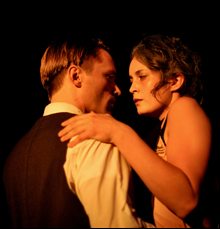
DECADENCE Burlesque, danger, and darkness in a thrilling tango. |
The lurching black satire of The Threepenny Opera is a study in grotesques: Monstrous caricatures of amorality and the blade of the bottom line are both repellent and ridiculously entertaining in this 1928 musical condemnation of capitalism, written through the legendary partnership of writer Bertolt Brecht and composer Kurt Weill. There is no Portland company I would rather see mount it than the audacious young Lorem Ipsum, and no more appropriately bare-bones venue than the warehouse-cum-roadhouse subversion of the Apohadion, where Threepenny runs for two more shows, under the direction of Tess Van Horn and Michael Dix Thomas.In the sordid London underworld, the ends justify business models like that of Mr. Peachum (Christopher Hoffman) and his missus (Andrew Sawyer, in curvaceous drag), who have cornered the market in deformed Londoners for their enterprise of organized beggary; and of the impeccably tailored Captain Macheath (Ian Carlsen), who commandeers a legion of twitchy freaks with fingerless gloves and handguns. When Mack whisks away Peachum's daughter Polly (Claire Guyer) and sort-of-marries her in a stable, Peachum schemes to see Mack hanged. Another obstacle for the marriage is the burgeoning belly of Lucy (Gabi Van Horn), an intimate of Mack's who also happens to be the daughter of Chief of Police Tiger Brown (Joe Bearor), himself Mack's old army buddy. And if Mack holds a true flame for anyone himself, it's boozy philosopher-prostitute Jenny (Mariah Bergeron). So with not a few conflicting interests playing out in the gutters and gaols, the proceeding treacheries make for quite a dark-comic carnival.
You've probably heard the show's opening number, "The Ballad of Mack the Knife," as a happy-go-lucky jazz standard or co-opted fast-food jingle. But Brecht's vision is brutal, and I'm gratified to report that Lorem Ipsum doesn't Vaseline the lens. Threepenny might be a show of raucous, funhouse horrors, but horrors still they are, and the ensemble makes this queasily clear from the show's very first verses, when a pale and schizo-looking Michael Dix Thomas wails with gravel, vertiginous intonation, and rage. Faces are pallid, with bulging eyes blackened like Edward Gorey ghouls. Gang scenes twitch and seethe; brothel scenes writhe in salacious, lurid drag. And under Jimmy Dorrity's fine direction, a nine-piece band careens exquisitely through a score dripping in jazz and irony.
For all the gritty, DIY aesthetics of this show, there is stellar precision on display. Guyer sings a breathtaking "Pirate Jenny," her voice chilly with vengeant eros, and she and the excellent Gabi Van Horn are magnificent in the difficult musical catfight of "The Jealousy Duet." While in places the grotesquerie could be stronger (Hoffman's Peachum should make a more outlandish cartoon of the poverty boss), the burlesques are mostly stellar, particularly Bergeron's ravishing Jenny: The high-strung clarity of her reeling, mordant remorse in "Solomon Song" is arresting, and her delicious tango with Mack — one of the only moments we see him truly aroused by a woman — is a decadence of limbs and jaded lust.
 Topics
Topics:
Theater
, Music, Opera, Kurt Weill, More  , Music, Opera, Kurt Weill, Theater, Theatre, Bertolt Brecht, Lorem Ipsum, Tess Van Horn, APOHADION, APOHADION, Less
, Music, Opera, Kurt Weill, Theater, Theatre, Bertolt Brecht, Lorem Ipsum, Tess Van Horn, APOHADION, APOHADION, Less 